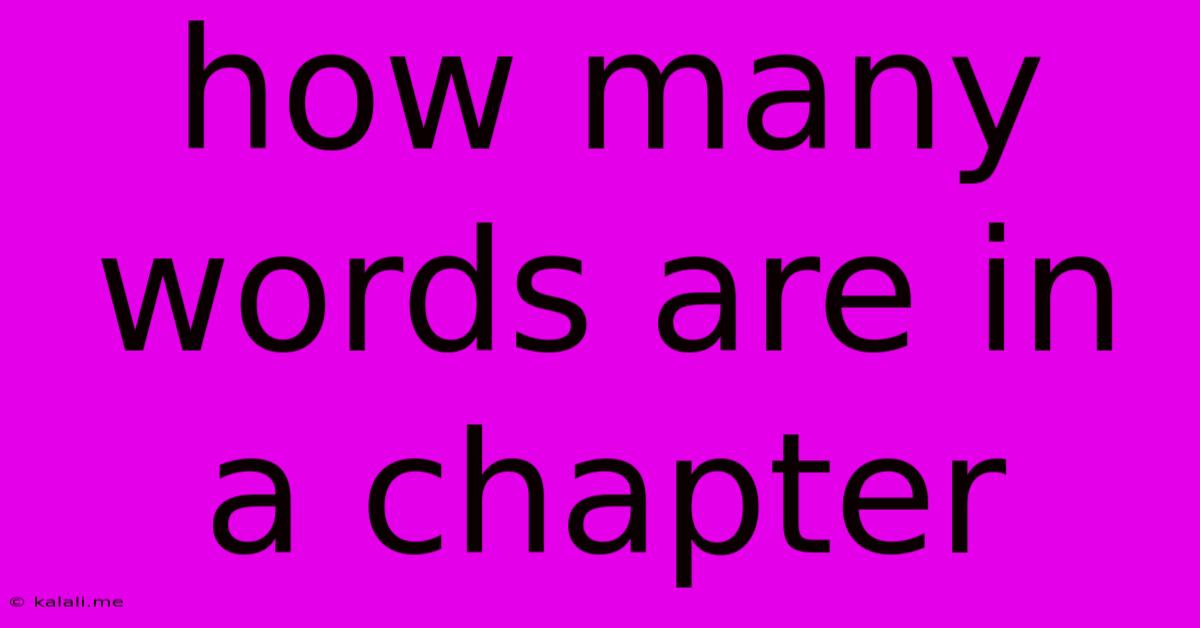How Many Words Are In A Chapter
Kalali
May 29, 2025 · 3 min read

Table of Contents
How Many Words Are in a Chapter? The Truth About Chapter Length
So, you're writing a book and you're wondering: how many words should be in a chapter? There's no single, magic number. The ideal chapter length depends heavily on genre, target audience, and your individual writing style. This article will explore the factors influencing chapter length and offer some helpful guidelines to navigate this common writing query.
Why Chapter Length Matters: Chapter length directly impacts pacing, reader engagement, and the overall flow of your story. Too short, and your narrative feels fragmented and rushed. Too long, and readers might feel overwhelmed and lose interest, leading to lower completion rates. Finding the right balance is key to a compelling reading experience.
Genre Conventions: A Guiding Light
Different genres often have established conventions regarding chapter length. Consider these examples:
-
Thrillers & Mysteries: These genres often feature shorter chapters, building suspense and encouraging readers to keep turning the page. Think cliffhangers at the end of each chapter to maintain momentum. Chapters in this genre might average anywhere from 500 to 1500 words.
-
Fantasy & Science Fiction: These genres can accommodate longer chapters, allowing for world-building and complex plot developments. Chapters might range from 1500 to 3000 words, or even longer in some cases.
-
Romance: Romance novels often fall somewhere in the middle, with chapters typically between 1000 and 2000 words. The pacing is generally slower than thrillers, allowing for character development and relationship building.
-
Young Adult (YA): YA novels often utilize shorter chapters, similar to thrillers, to maintain a fast pace and keep younger readers engaged. Chapter length often stays within the 500 to 1500 word range.
-
Literary Fiction: Literary fiction can vary greatly, with some authors opting for longer, more reflective chapters, while others prefer shorter, more concise ones.
Beyond Genre: Other Factors to Consider
While genre conventions provide a useful starting point, other factors also play a crucial role:
-
Your Writing Style: Some authors naturally write longer, more descriptive passages, while others favor a concise and direct style. Let your unique voice guide your chapter length.
-
Scene Breaks and Pacing: Natural breaks in the narrative often dictate chapter divisions. Consider ending a chapter on a cliffhanger, a significant revelation, or a moment of intense emotion to enhance reader engagement.
-
Target Audience: Younger readers might have shorter attention spans, warranting shorter chapters, while adult readers may be more comfortable with longer ones.
Finding Your Sweet Spot: Experimentation and Revision
Ultimately, the ideal chapter length is subjective and requires experimentation. Don't be afraid to try different lengths as you write. You can always adjust them during the revision process. Pay close attention to reader feedback (if you share your work) and analyze your own pacing to refine your chapter structure.
Word Count as a Guideline, Not a Rule
Remember, the word count is a guideline, not a rigid rule. Focus on telling your story effectively and engaging your readers. A well-structured chapter, regardless of its length, will always be more effective than a poorly paced one, regardless of its adherence to a specific word count. Prioritize storytelling above all else.
By considering these factors and experimenting with different lengths, you can find the optimal chapter length that suits your story and resonates with your readers. Happy writing!
Latest Posts
Latest Posts
-
Can Bulletproof Glass Be Broken By Sound
May 30, 2025
-
How To Wire Switch To Light
May 30, 2025
-
After Abstract Removed It Came Back
May 30, 2025
-
How Long Can You Ride On A Donut
May 30, 2025
-
How To Reset Oil Life Honda Accord
May 30, 2025
Related Post
Thank you for visiting our website which covers about How Many Words Are In A Chapter . We hope the information provided has been useful to you. Feel free to contact us if you have any questions or need further assistance. See you next time and don't miss to bookmark.